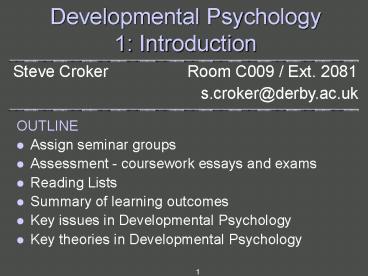Developmental Psychology 1: Introduction - PowerPoint PPT Presentation
1 / 18
Title:
Developmental Psychology 1: Introduction
Description:
Psychodynamic Theories. Behavioural Learning and Social Cognitive Learning Theories ... Psychodynamic Theories. Development is an active process influenced by: ... – PowerPoint PPT presentation
Number of Views:184
Avg rating:3.0/5.0
Title: Developmental Psychology 1: Introduction
1
Developmental Psychology1 Introduction
Steve Croker Room C009 / Ext.
2081 s.croker_at_derby.ac.uk
- OUTLINE
- Assign seminar groups
- Assessment - coursework essays and exams
- Reading Lists
- Summary of learning outcomes
- Key issues in Developmental Psychology
- Key theories in Developmental Psychology
2
Assessment
- 1 coursework essay (40) - 2000 words
- 1 4 minute oral presentation (10)
- 1 essay based exam (50)
- Titles for the coursework essay are on the web
- Deadline for coursework essays Friday 21st
November, 12 noon - Oral presentations take place on 17th November,
24th November, 1st December
3
Reading Lists
- Core Text
- Dworetzky, J. P. (1996). Introduction to child
development (6th ed.). St. Paul West. - Or
- Bukatko, D. Daehler, M. W. (2001/2003). Child
Development A thematic approach (4th Ed./5th
Ed.). Boston Houghton Mifflin. - Recommended reading and journals - on 'reading
resources' webpage - Additional reading - given in relevant lectures
4
Learning Outcomes
- assess critically the main theories, models and
research in developmental psychology and of
specific phenomena relating to child development.
- engage in independent enquiry of a specific
aspect of developmental psychology and evaluate
this in relation to theories, models and research
in development.
5
2 basic themes
- There are two basic themes to bear in mind
throughout the course - Key issues in developmental psychology
- Key theories in developmental psychology
6
Key Issues
- Key Issues 1 Domains of Development
- There are three domains of development
- physical development
- cognitive development
- psychosocial development
- Key Issues 2 Change vs Continuity
- Developmental psychology assesses development by
looking at - change
- continuity
7
Key Issues
- Key Issues 3 Nature vs Nurture
- Developmental psychology assesses the
contribution to development of - Nature
- Nurture
- Key Issues 4 Continuous and Stage-like changes
- How much does development simply continue earlier
acquisition - gradual or CONTINUOUS development? - How much does development lead to qualitatively
new behaviours and skills - STAGES of
development?
8
Key Issues
- Key Issues 5 Universal vs Context-specific
development - How much can we identify changes that happen to
everyone? - How much should we take into account specific
human and cultural contexts and experiences?
9
Key Theories in Developmental Psychology
- Cognitive-Developmental Theories
- Psychodynamic Theories
- Behavioural Learning and Social Cognitive
Learning Theories - Contextual Developmental Theories
- Nativist Theories
10
Cognitive Developmental Theories
- Focus on cognitive development
- how thinking and problem solving develop
- how cognitive activities contribute to
development in general - Piagets Age-Stage Theory
- children show qualitatively different levels of
comprehension and reasoning at different ages - role of environment merely to provide information
- everyone passes through the same 4 stages of
development
11
Cognitive Developmental Theories
- Neo-Piagetian Theories
- variations on Piagets theory (e.g. Case 1991,
Fischer, 1980) - Information Processing Theories
- concerned with how information is stored,
retrieved, organised and manipulated - development -gt information processed more
efficiently - developmental changes occur in
- cognitive control proceeses
- metacognitive ability
- amount of knowledge
- changes occur continuously in specialised areas
as a result of experience
12
Psychodynamic Theories
- Development is an active process influenced by
- inborn, biological drives
- social/emotional experiences (conscious and
unconscious) - People pass through stages of development
- Freuds Psychoanalytic Theory
- born with basic animal unconscious instincts
- development depends on transforming these into
socially acceptable, rational behaviour
13
Psychodynamic Theories
- Eriksons Psychosocial Theory
- role of
- internal psychological factors
- Life circumstances and developmental history
- social cultural and historical context
- 8 psychosocial stages of development based on a
sequence of crises. - Resolution of crisis important for healthy social
development
14
Behavioural Learning and Social Cognitive
Learning Theories
- Learning and experience are source of
developmental change - development gradually occurs as we learn new
responses as a result of experience - individual life experiences differ, therefore
learning differs - Behaviourist Theories (e.g. Pavlov Skinner)
- conditioning
- learn by responding to stimuli
- Social Cognitive Learning Theory (e.g. Bandura)
- observational learning
- imitation
- modelling
15
Contextual Developmental Theories
- Development viewed as process of reciprocal
interactions between - child
- physical and social environment
- development continuous
- role of environment emphasised
16
Contextual Developmental Theories
- Vygotskys theory
- development occurs gradually as child interacts
with environment - through interactions children internalise new
ways of behaving and thinking - Ethological theory
- emphasises the role of evolution in development
- inborn tendences predispose children to act in
certain ways - but interaction with environment moulds behaviour
17
Nativist Theories
- Development is product of interaction between
environment and innate, domain-specific modules - Role of the environment is minimal
- Fodor
- Spelke
- Chomsky
18
Learning outcomes for lecture 1
- Know and be able to evaluate the main theories of
development - Know and be able to discuss the key issues in
developmental psychology - Know and be able to discuss what each theory
states about the key issues






























![Download Book [PDF] Handbook of Cultural Developmental Science PowerPoint PPT Presentation](https://s3.amazonaws.com/images.powershow.com/10051362.th0.jpg?_=20240609104)
